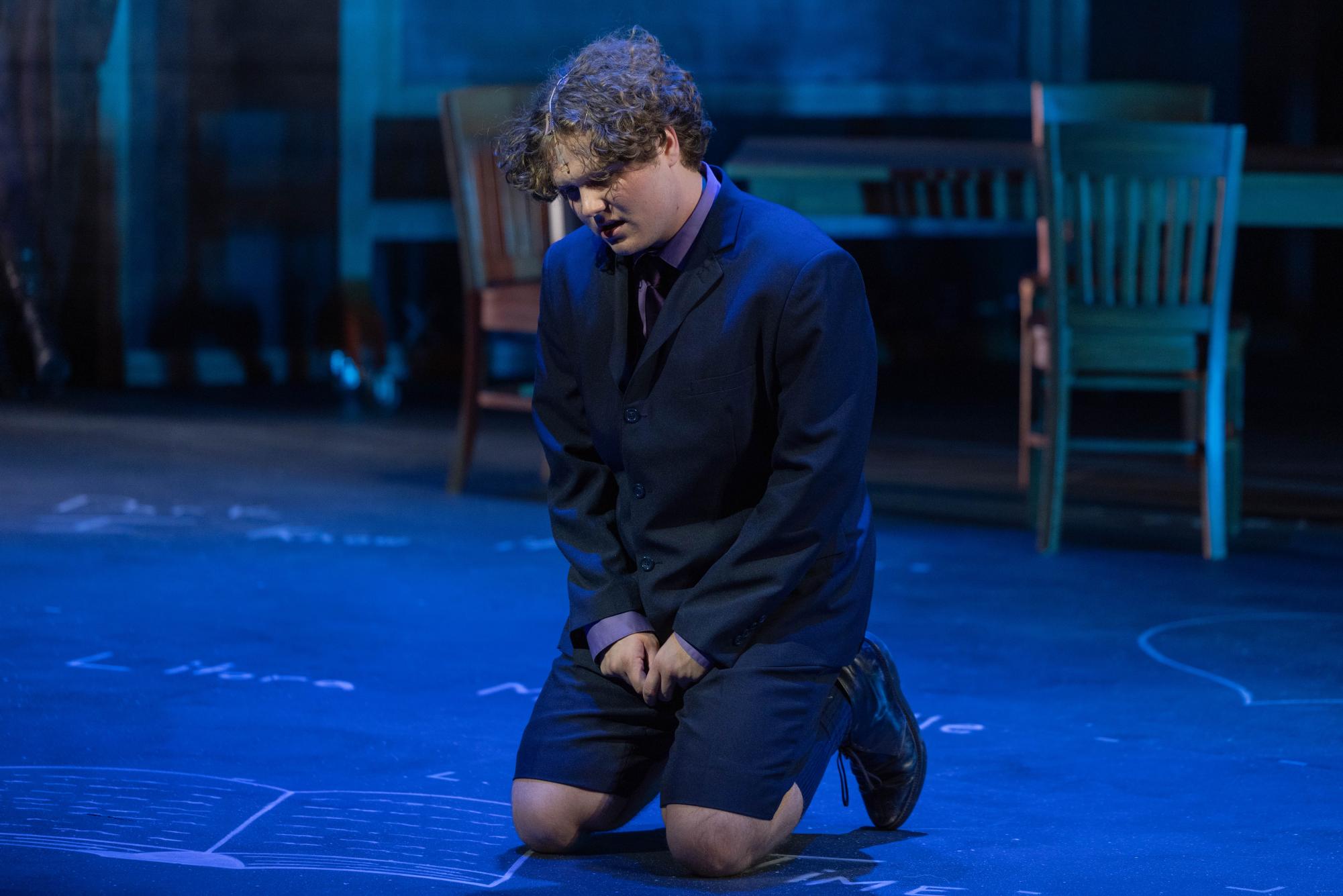Thought-provoking is the best way to describe the University Theatre’s production of “Spring Awakening.”
The set in which the story unfolds is molded to resemble the thoughts that the adolescent youths in the play are trained to only think about. The stage is decorated with numerous chalkboards and a transparent screen with math equations and Latin phrases written on it that veiled the live band.
“Spring Awakening” written by Steve Sater, composed by Duncan Sheik and directed by J. Daniel Herring is a musical that, despite having been adapted from an 1891 play by Frank Wedekind, still proves to be relevant in this modern age.
Wendla, who is powerfully portrayed by Chloé Mae Tabor, presents the audience with the curious number “Mama Who Bore Me,” during the opening. Immediately, the number presents the audience with an uncomfortable conversation on the explanation of sexual intercourse from a parent to their child.
Wendla’s mother, who seems uncomfortable even thinking about the topic, fails to enlighten Wendla on conception and the potential risks that come with it. Rather, she keeps her response vaguely short and tells her child that for her to have a child, she must love her husband and only him.
“Spring Awakening” is controversial for its bold approach on tackling necessary topics about sexual health. It instead attempts to normalize its approach to teenagers having sexual thoughts and acts with the challenge of adults dehumanizing them for having these feelings instead of educating them.
In another light, it undermines the sense of security parents provide for their children, instead shaping children according to the parents’ image and reputation. This outcome leads the character Moritz, played by Grant Hill, to have significant pressure to the point where he takes his own life.

Melchior, played by Tyler James Murphy, becomes the one among all his peers who attempts to normalize sexuality, but because his peers are made to feel less than for feeling these emotions, it still is embarrassing for them to express what they are feeling.
The exploration of sex is explicitly shown on stage between Wendla and Melchior, who provide a visceral look at what Wendla believes is love and Melchior giving into carnal pleasures. He’s aware of what he’s doing and knows the risks involved with it but doesn’t provide Wendla with any idea about what they are about to engage in.
Because of the repression and effort to educate the youth on sexuality, the audience is exposed to the complications of teen pregnancy and the constant reminder that the topic of sexuality shouldn’t be discussed at all.
The music composed for this musical is divergent because of its use of rock and roll elements infused with folk roots. The combination of heavy drums and a viola is not commonly brought together, but works here to combine the two timelines of the modern and The Progressive Era.
The performance from Hill as Moritz was perhaps the most outstanding. Moritz, who appears to be the misfit amongst his peers, is distinguishable through his disheveled hair, inability to stay awake and one sock rolled down further than the other one.
When it comes to the somber moment that he has unfortunately failed in school despite his efforts to pass, his parents degrade him as being nothing more than a disappointment.
When Moritz confesses to the audience that darkness is all he can see on the horizon, several stray tears roll down Hill’s cheeks. Admittedly, I felt like I was in his shoes for a second.

The themes presented in “Spring Awakening” are still pertinent today, especially in the macabre visualization of Moritz’s demise.
According to a 2023 report from the Centers for Disease Control and Prevention, suicide is the second leading cause of death among teens and young adults ranging from 10-30 years old. Among those rates, 22% of high school students considered suicide in the past year.
Tabor’s vocals are excellent and a perfect representation of her character Wendla: girlish but wanting to explore her innocence further when she finds herself developing feelings for Melchior. Perhaps one thing unifying the company amongst the highs and lows of the story are the various shades of purple embedded in each of the character’s costumes. Sofia James’ choice for elevating the story resulted in her decision to give certain characters darker colors that represent their demise or unfortunate reality.
Wendla and Melchior both wear a lighter shade of purple, a lilac perhaps to signify their curiosities and innocence. Martha and Ilse, played by Emma Raymond and Mikayla Rockwell, are dressed in darker shades of plum purple: Martha experiences active abuse by her father, and Ilse is left homeless and assumed to have become a prostitute.
“Spring Awakening” provided audiences with a raw look at the thoughts adolescents face when they are left to discover parts of being human that are shunned in their society and gave viewers a rocking soundtrack paired with insight into self-discovery.

